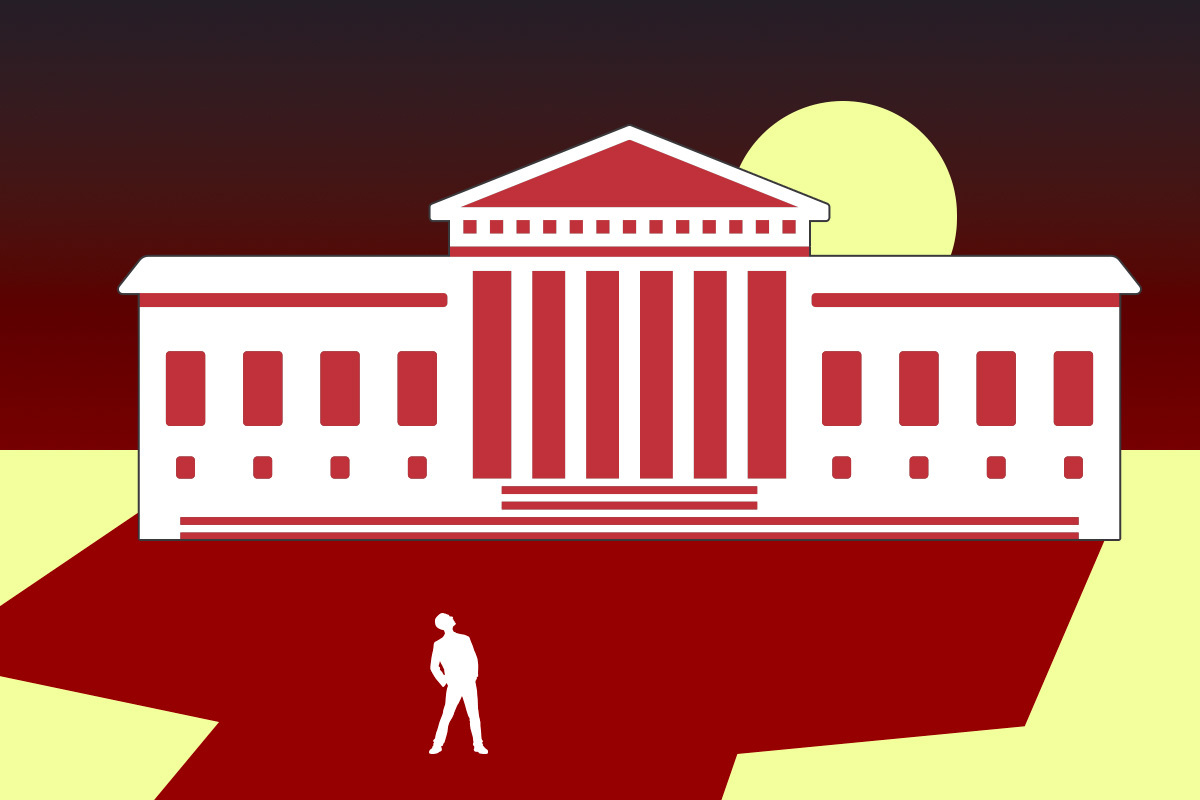A case that could have staggeringly far-reaching ramifications is on the Supreme Court’s docket for the upcoming term and has, broadly, attracted very little attention.
But for a ragtag group of activists and organizers on the ground in Indiana, it’s become something akin to a second job. A loose coalition of activists from all corners — consumer advocacy in utilities, disability rights, progressive politics — has banded together to navigate an opaque municipal corporation, unusual political bedfellows and the might of the Supreme Court.
Their mission: to get the Health and Hospital Corporation of Marion County, Indiana (HHC) to drop its appeal of a case brought by the family of Gorgi Talevski, the late inhabitant of a local nursing home who, his family alleges, was abused there.
In its years wending through the court system, the case has taken on a new dimension, eclipsing the alleged poor treatment of Mr. Talevski. Now, the Supreme Court could use it as a vehicle to shut down one of the only pathways to accountability that beneficiaries of federal spending programs like Medicaid have if states neglect their care.
“This case is to Medicaid what Dobbs was to abortion,” Sara Rosenbaum, professor of health law and policy at George Washington University’s school of public health, told TPM.
Without that accountability mechanism, states could potentially end or curtail services for the tens of millions of Americans enrolled in programs including Medicaid, SNAP (formerly food stamps) or WIC (which helps low-income pregnant women and mothers buy food) with little consequence. These programs are often designed to help Americans who are already vulnerable, including those who are elderly, disabled and/or low-income.
Without much money or attention, and while battling some truly cosmically bad timing, the coalition is trying to stop the case before the right-wing court majority can get its hands on it. The activists have mounted a full-scale pressure campaign on the HHC board, and any politicians who can help sway its members.

The Noise
The Talevski family — primarily via Gorgi’s daughter, Susie Talevski, a lawyer who has shouldered the case for her then-ailing and now-deceased father — sued under a federal statute called Section 1983, which allows individuals to bring their cases to federal court when their rights are violated under spending programs including Medicaid.
The family saw its case dismissed at U.S. district court, but triumphed at the 7th Circuit Court of Appeals.
Then, in a move that stunned the local activists, HHC appealed to the Supreme Court.
The Court granted certiorari on May 2, 2022: the same day that Politico published the leaked draft opinion in Dobbs v. Jackson Women’s Health Organization, revealing Justice Samuel Alito’s majority opinion overturning Roe v. Wade. The Talevski case was buried.
As activists got organized and tried to muster attention and enthusiasm for the case in the summer months, the public’s frustration with the Supreme Court remained focused on abortion. The Indiana general assembly reconvened for a special session in July stretching into August. At the end of the session, Indiana became the first state to pass an abortion ban post-Dobbs.
“Our online press release didn’t garner as much attention as we thought it would, unfortunately,” Bryce Gustafson, an organizer with Indiana’s Citizens Action Coalition, told TPM.
The details of the case don’t do organizers any favors. Activists and experts alike acknowledge that it’s complicated, wonky. The big question centers on private rights of action under Section 1983, which is part of a Reconstruction-era civil rights law meant to protect newly freed slaves from being terrorized by state officials.
In the decades since, it has been expanded to cover constitutional and statutory rights, including under spending legislation like Medicaid. The federal government has relatively few tools to force compliance with the services states must provide to get funding, and these lawsuits have become indispensable in terms of accountability. They also help point Health and Human Services (HHS) towards the big violators who need policing.
HHC’s appeal of the Talevski case asks this uber-conservative Supreme Court to reconsider the whole framework and nix that ability to sue. Red state attorneys general have celebrated the Court’s decision to take the case.
“I have a feeling that if the board really understood what this case is about, they’d be mortified,” Gustafson said. “There’s a doctor on the board, a disability rights lawyer on the board.”
Now, activists are trying to fight through the noise of a historic Supreme Court term and its nationwide implications to sell the HHC board and the public on a case centered on a fairly complex legal question. So far, it’s not been an easy task.

The Sell
The group has been deploying classic grassroots activism: sending lots of emails, approaching local politicians at events and conferences and showing up at meetings that largely no one attends.
For years, the HHC board meeting records concluded with a note that there were no public comments before the end of the session.
In the last couple months, though, they’ve been punctuated with records of activists “expressing their concern about the HHC, et al., v. Talevski case.”
“We’re the only members of the public that show up to those,” Gustafson said. “A couple of board members have approached us one way or another, wanting to hear more about this.”
But their curiosity, according to the activist coalition, didn’t go much further than that.
“Nobody has shown any interest in talking to the public about this,” added Mike Oles, the Indianapolis-based national field director for Our Revolution, who is helping drive the effort.
The activists combed through years of HHC board meeting minutes, finding no mention of the Talevski case, much less a board vote to petition the Supreme Court. They’re now going through the state Public Access Counselor to obtain any record of such a vote; he’s given HHC until Thursday to produce the information.
Six of the seven members of the board did not respond to TPM’s interview requests or to emailed questions. Board member Monica Crain directed TPM to HHC’s communications director Curt Brantingham, who did not answer a list of questions, saying only that “the Health and Hospital Corporation of Marion County does not comment on pending court cases.”
Activists told TPM that the board removed an email portal from its website after they started reaching out; at the time of publication, only a snail mail address was listed under ways to “contact the board.”
Hitting a brick wall with the HHC board, the organizers turned to the Indianapolis-Marion County City-County Council to apply some pressure.
The council represents one of the few Democratic strongholds in the deep red state, and would seem to be a natural ally in the cause — especially after Todd Rokita, the far-right state attorney general utterly reviled by Democrats, filed an amicus brief backing HHC.
But they didn’t have much luck there either.
“They’re not bothered, not educated, not particularly alarmed,” Oles said. “I thought this would be an easy walk in the park — these are Democrats, these are our people, I know all of these people.”
He attributes the lack of councilor enthusiasm to HHC lobbying that the case is primarily just to curtail frivolous lawsuits — no big deal.
“We’ve been trying to give testimony to how this case will impact our lives, everyday lives, not just in Indiana but the implications across the nation,” Jalyn Radziminski, communications director at the Judge David L. Bazelon Center for Mental Health Law, told TPM. “To be frank, it’s been very difficult.”
Activists did point out that Councilor Jared Evans has been relatively outspoken about the case, reading out a statement to HHC CEO Paul Babcock before the Municipal Corporations Committee.
“I don’t know what we can do, but it is going to be my job, until that Supreme Court case is heard, to bring light to this and make sure the public is fully aware of it,” Evans said at the July 13 hearing. “Because I don’t believe that any entity under the guidance of this council, this mayor, this city, should be pursuing this Supreme Court case that has such an impact not just on our city, but everybody in this country.”
Evans did not respond to TPM’s interview requests.
Babcock did not field questions about the case during the hearing, citing “pending litigation.” He emphasized that the case was filed in court before he became HHC president and CEO.

The Alternative
Some activists have also targeted the other side of the case: the Talevskis. If the two sides can agree to a settlement, the case would be kept away from the Supreme Court.
“Some activists are trying to push for some resolution for the family that involves changes to nursing home practices locally and state-wide that doesn’t involve this massive question,” Brit Vanneman, staff attorney at the Bazelon Center, said of the broader fight over 1983 actions.
While the idea hasn’t gained much traction, it’s the more common off-route in attempts to stop cases before oral argument, said Arthur Hellman, a professor emeritus and expert in federal courts at the University of Pittsburgh’s school of law.
“A settlement on the eve of argument is something that happens more often in business cases, which is not surprising because business people look to the bottom line and dollar amount,” he told TPM. “If they can get something that satisfies their business needs, they have no interest in establishing a precedent.”
But there are also multiple examples of non-business related cases being dropped shortly before oral argument.
In 1997’s Piscataway Township Board of Education v. Taxman, advocacy groups paid a white teacher who’d been laid off $433,500 to drop the case, out of fear that the Supreme Court would dismantle affirmative action in employment or even more broadly.
Hellman also cited two, more recent cases, out of the 3rd and 8th circuits, both centered on fair housing questions. Magner v. Gallagher in St. Paul, and Mount Holly v. Mt. Holly Gardens Citizens in Action, Inc. out of Mount Holly, New Jersey were both settled before they reached oral argument.
“The cities had petitioned for certiorari and were successfully on the docket,” he said. “And in both cases, the cities were persuaded to withdraw the petitions.”
There is clear precedent for what the activists are trying to do: Whether the parties file an agreement that the case be dismissed, or reach a settlement, the case would be withdrawn before the Court can get to it.

The Future
Undismayed by the general obstinance, the coalition is ramping up its action, especially as it expects amicus briefs from major organizations to start hitting the docket.
They’re planning an in-person and virtual sit-in during a Municipal Corporations Committee hearing, where Babcock is expected to attend and present on the corporation’s budget.
They’ll also be delivering a letter with much fanfare to HHC this week, asking for a special meeting to publicly hear testimony and see a vote from the board on the case.
“The longer this goes on, the harder it’s going to be,” Gustafson said, noting that oral arguments are scheduled for November 8. “I’m trying to envision the future here next year when they rule — it would be a dark day for Indianapolis and across the country.”





And once again we have the spectacle of a so-called Christian nation gleefully willing to throw its poor, its sick, its huddled masses of citizens under the bus of corporate greed and cynicism.
Until we cut the corporations off at their political knees and get their money, all of it, out of our politics, we will teeter on the edge of the abyss of tyranny and one day one small push will hurl the nation into that darkness.
Oh, one more thing. The current Republican party must be burned to ground and buried in the deepest pit we can find. And we should throw half the current Supreme Court justices in the pit with the Republicans.
If the Supreme Court is determined to slash the Social Safety Net there’s NOTHING that can be done to stop them. Not directly. The current Court is a GOP PAC insofar as it acts. It’s purpose is to get done what Democracy will not allow the GOP to do. If voters take reprisal on the GOP for the Court’s actions that might slow things down a bit.
That Court was built to advance the worst of the GOP’s agenda. I don’t see them stopping that unless the GOP takes a hit for it. They probably won’t though.
My first impression is this story represents a lot of work on the part of the reporter and possibly her editor. My compliments and I hope to see more of the kind of work that attracted me to TPM during the dark years of the Bush era.
@kate_riga I think the word you want there is Reconstruction-era.
Yes, that was my first reaction as well. Riga did her HW provided good analysis, sourcing & background. I suppose we could call this “vintage” TPM as it is uncommon post Trump.